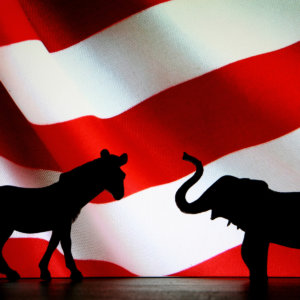What Companies Should Learn About Social Media From American Politics
Beware the “filter bubble” effect of social platforms.
Topics
Social Business
I’m always willing to listen to people who can predict the future. One example I often use with respect to digital media is Cass Sundstein’s 2001 article “The Daily We,” in which he predicted that the Internet would ultimately lead to increased fragmentation and polarization in American public life. Much of what he predicted in 2001 is playing out in the current U.S. presidential race, particularly among Republicans, where we see an unprecedented number of candidates who continue to stay in the race despite single-digit poll numbers.
One reason may be that social media is giving candidates and their supporters an unrealistically optimistic perception of their own chances of success, resulting in the current persistent fragmentation. The reasons behind this trend also have important implications for using digital tools for business.
Content Filtering and News Feeds
To be sure, a number of factors have led to the current fragmented political environment, but Sundstein predicted that a single digital feature would result in this outcome — a user’s ability to filter digital content. When social media tools provide the ability to find the content we most want to read, we are most likely to search out content that confirms our existing views. Algorithmic search tools like Facebook’s newsfeed exacerbates this tendency by automatically recognizing which content we have sought out in the past and then showing users other content that is most like that which we have previously viewed. We no longer need to seek out the content that confirms our own views — Facebook finds it for us. As a result, we rarely engage with content that represents viewpoints different from our own.
The same characteristic also extends to those with whom we connect using social media tools. The Internet provides a nearly limitless ability to connect with almost anyone online, and research has long shown that the types of “weak ties” we establish on these platforms can be very valuable for finding information. On the other hand, we are also likely to use this unparalleled networking ability to connect mostly with people who are most like ourselves, which compounds the effects of content filtering. Social media allows us to connect only with people who are most like us and only listen when we like what they say, resulting in merely the illusion of broad and diverse weak-tie networks for information sharing on social media platforms.
This tendency for social media to support our existing views and preferences is no accident. It’s what users want. People want to spend time in environments where they are supported and liked. The more we are supported and liked, the more time we spend on social media sites, and the more content we share through it.
It is this innate preference upon which the business model of social media is built. The more time we spend on social media, the more advertisements they can show us, and the more data they can collect to more effectively tailor the environment to our established preferences. Social media succeeds by creating a comfortable environment that continually reassures us that most people are like us, that our own views are the “right” ones, and that they are shared by a greater number of people than they actually are.
Implications for Decision-Making
While this filtering creates a comfortable personal environment, the larger societal and organizational consequences are more complex. Eli Pariser, in a more stylized version of Sundstein’s argument, calls this phenomenon the “filter bubble.” Awareness of this tendency for social media to result in filter bubbles is important for executives and companies using social media for communication, innovation, and decision making.
First, executives should be aware of this filter-bubble tendency when using social media data for decision making, recognizing that the voices that come through on social media are not necessarily representative of the majority of customers or stakeholders — they may only represent the views of a small but vocal online community. For example, when Dell Inc. decided to use social media to launch Linux laptops, the effort yielded lackluster results, partly because Dell failed to recognize that the online voices were not representative of a larger customer base.
Even if a particular view is representative of all users of a specific platform such as Twitter, those users may not reflect the overall views of the population at large. As an example, Twitter sentiment nearly unanimously supported Scotland’s independence from the United Kingdom during a 2014 referendum, but the measure failed at the polls, with slightly more than 55% of Scots voters rejecting the measure. Social media data can result in an invaluable source of insight for companies, but only when used correctly. Executives should always augment that social media data with other sources of information before using it for important decisions.
Second, companies should also be aware of this tendency toward filter bubbles when using social media for internal communication and collaboration purposes. The same filter bubble dynamics can occur among employees just as easily as it does in politics, but Sundstein’s analysis offers some helpful guidance for how to avoid them. He notes that shared experiences are important for developing the types of connections and information exchange that break down filter bubbles. As companies move more toward virtual environments, they may intentionally schedule time to provide these shared experiences. These may take place as weekly “all hands” meetings where all members of an organization can get on the same page. They also may take the place of intentional face-to-face meetings that help people develop and strengthen relationships with people who may be somewhat different from them.
My own experience observing recent political trends convinces me that Sundstein was prescient in his analysis of how online filtering mechanisms would affect public life. I certainly don’t have the answer for how to fix American politics, but executives should be aware of this tendency of social media to result in filter bubbles as we move into a world where personal and professional communication increasingly occurs over social media platforms, and where companies increasingly use this data for decision making.






Comments (2)
Peter Modigliani
Omagbitse Barrow